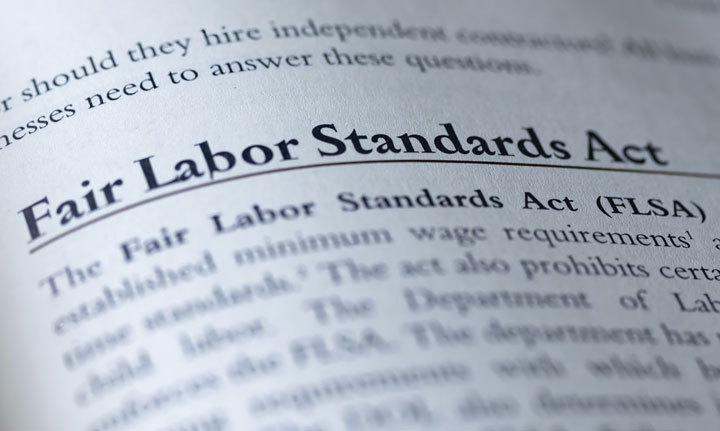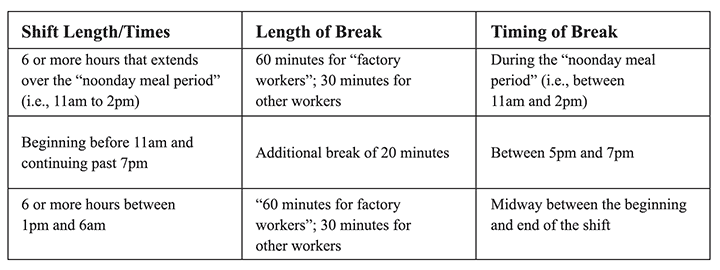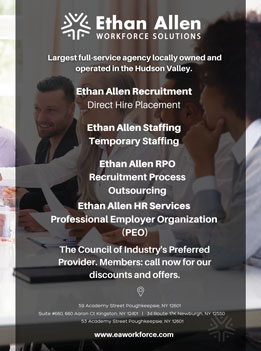WAGE AND HOUR CHECKLIST FOR NEW YORK MANUFACTURING EMPLOYERS

Wage and hour issues continue to challenge most employers, especially those in the manufacturing industry. The manufacturing industry tends to be more process- and systems-oriented and generally employ many hourly workers who are not exempt from overtime pay under the Fair Labor Standards Act (FLSA) or the New York Labor Law (NYLL).
Manufacturers must ensure they are legally compliant. Indeed, non-compliance can trigger audits, investigations, and litigation — all of which can be disruptive, time-consuming, and costly for manufacturers. The U.S. Department of Labor (USDOL), which is charged with investigating alleged violations under the FLSA, and the New York Department of Labor (NYSDOL), which administers the NYLL, assess hundreds of millions of dollars each year in penalties to employers.
The following is a short (but by no means exhaustive) checklist of common pay issues in the manufacturing industry.
1 donning and doffing
The law requires employers to compensate non-exempt employees for all time worked, as well as pay the minimum wage and overtime compensation. Whether pre-shift (donning) and post-shift (doffing) activities are included as compensable time is not always clear.
Activities including putting on or taking off protective gear, work clothes, or equipment could be compensable time depending on the unique facts of the situation. Generally, to be compensable, such activities must be found to be integral and indispensable to the “principal activity” of the employer’s work under the FLSA and the Portal-to-Portal Act of 1947.
Courts differ on whether time spent donning and doffing is compensable because these issues often implicate mixed questions of law and fact. Moreover, collective bargaining agreements can affect whether time spent changing clothes and washing is compensable for the purposes of determining hours worked for minimum wage and overtime calculations under the law. Employers should carefully review their policies to ensure the compensability of pre-shift or post-shift activities being performed by non-exempt employees.
2 rounding time
Accurately keeping up with time worked by non-exempt employees is critical to compliance. Employees forgetting to clock-in and clock-out timely is a persistent issue, as well.

While the FLSA and NYLL allow employers to round employees’ clock-in and clock-out times rather than pay by the minute, it is generally unnecessary (and not recommended) with today’s sophisticated time clocking systems. If employers choose to round time, they must ensure that any rounding policy is neutral on its face and neutral in practice.
In other words, the policy must round both in the favor of the employer and the employee at roughly an equal weight. For employers engaging in rounding, audits are crucial as even a facially neutral rounding policy that, in practice, has disproportionately benefited the employer and cumulatively underpays the employees can be found to violate the FLSA and NYLL.
3 Meal breaks
Under the FLSA and NYLL, employers must compensate for short rest breaks that last 20 minutes or less. However, employers do not have to compensate employees for a bona fide meal break, which ordinarily lasts at least 30 minutes. Importantly, an employee must be completely relieved from work duties during this uncompensated time and cannot be interrupted by work (even for a short time). Indeed, some courts have held that, where a meal break has been interrupted by work, the entire meal break (not just the time when work was performed) becomes compensable.
Section 162 of the NYLL goes further to specify when breaks must be given and for how long they must last. These requirements are based on the length and timing of the employee’s shift, and can be summarized as follows:

Per the NYLL, a factory includes “mill, workshop, or other manufacturing establishment and includes all buildings, sheds, structures or other places used for or in connection with these establishments.” An employee will be considered a “factory worker” if their primary duties involve the maintenance and/or operation of a factory; administrative employees generally do not meet this definition.
Guidance from the NYSDOL states that, for factory workers, employers may lawfully offer “a shorter meal period of not less than 30 minutes as a matter of course … so long as there is no indication of hardship to employees.” Hardship may be found if it would be difficult for an employee to take a full meal break in 30 minutes because of donning and doffing requirements, the length of time to get from the manufacturing floor to the lunch room, or other issue that infringes on an employee’s break time.
To ensure compliance under these rules, employers should have policies and practices in place so that employees can take uninterrupted meal breaks. Employers should also have a well-communicated reporting system in place for employees to record any interrupted meal break to ensure the employee is compensated for the meal break or, when possible, a new meal break is scheduled.
4 Minimum wage
Although the minimum wage under the FLSA has not changed in several years, New York’s minimum wage increased again this year with more scheduled increases to come. For manufacturers, minimum wage will depend on where the employee works as follows:

Failure to pay minimum wage could lead to back pay, liquidated damages, and other penalties.
5 regular rate
A common and incorrect assumption many employers make is that overtime pay under the FLSA and NYLL is calculated at one-and-a-half times a non-exempt employee’s hourly rate when they work more than 40 hours in a workweek. In fact, the law states overtime is calculated based on the non-exempt employee’s “regular rate” of pay.
The law requires that all payments to employees for hours worked, services rendered, or performance be included in the “regular rate” unless the payment is specifically excluded in the law. Thus, any non-discretionary bonuses, shift differential pay, and other incentive payments such as commissions should be included in the regular rate of pay calculation for purposes of calculating overtime under the FLSA and NYLL.
This is relatively easy when a bonus is paid during a week where the non-exempt employees work more than 40 hours, but it can become complicated when the additional pay is paid on a yearly, monthly or quarterly basis. In this scenario, the payment must be averaged out over that longer time period to determine the regular rate such that overtime can be properly calculated. Thus, employers should review their payment processes on the front end to ensure compliance before any small errors or omissions multiply out of control.
6 new york state sick leave law compliance
Although not necessarily a wage and hour issue, it is important for New York employers to confirm they are providing sick time to all employees in accordance with the New York State Sick Leave Law (NYSLL) implemented in 2020. Prior to this law, New York employers had complete discretion regarding whether to offer sick time, to whom to offer it, how much sick time to offer, what such time could be used for, etc.
Now, the law specifies, among other things: all employees be permitted to start accruing time immediately upon hire; the minimum accrual rate (i.e., 1 hour for every 30 hours worked); the number of hours employees must be able to accrue and use (i.e., up to 40 hours for employers with less than 100 employees, 56 hours for employers with 100 or more employees); the reasons for which use must be allowed (e.g., the employee’s sickness, a family illness, to seek help for domestic abuse issues); minimum increment for use (i.e., 4 hours); unused time must be carried over into the following year; and rules regarding when and what type of documentation may be required from the employee.
Failure to comply with these NYSLL requirements may lead to damages and monetary penalties.
©2024 Jackson Lewis P.C. This material is provided for informational purposes only. It is not intended to constitute legal advice nor does it create a client-lawyer relationship between Jackson Lewis and any recipient. Recipients should consult with counsel before taking any actions based on the information contained within this material. This material may be considered attorney advertising in some jurisdictions. Prior results do not guarantee a similar outcome.






